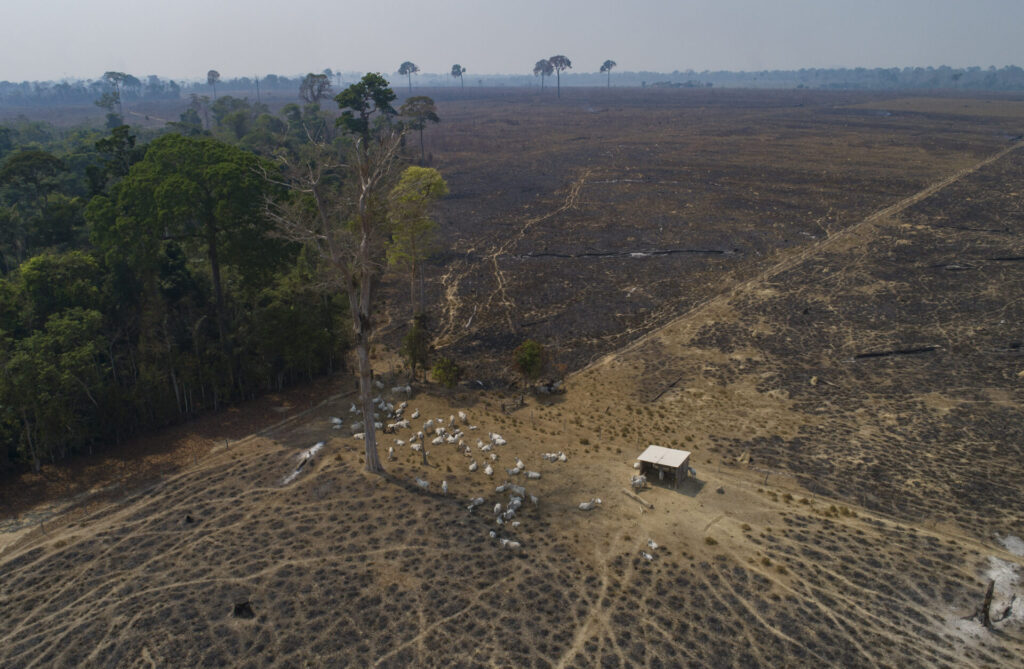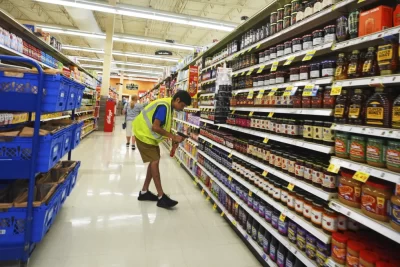
FILE - In this Aug. 23, 2020 file photo, cattle graze on land recently burned and deforested by cattle farmers near Novo Progresso, Para state, Brazil. The cattle industry in Brazil is a major driver of destruction of the Amazon rainforest, a fact documented by the World Bank and numerous academic studies. (AP Photo/Andre Penner, File)
The FBI Investigation
PMI Foods has come under scrutiny from U.S. authorities before for its shipments to China.
Between 2008 and 2011, PMI took in more than $289 million in revenue from illegal beef shipments to China, representing the majority of U.S.-sourced sales to the country, according to a spreadsheet produced by a whistleblower for FBI investigators.
“They were willing to break laws,” whistleblower Brandon Barrick said in an interview in 2022, referring to the time that he worked at PMI. “They were willing to do whatever it took to make a buck for themselves.”
In spring of 2014, PMI pled guilty to a misdemeanor charge of making a false statement to U.S. authorities about the destination of its beef exports and paid a $1 million fine.
In an email, PMI said it had put the “entire episode behind us” nine years ago, and emphasized that it pleaded guilty only to making a false statement. “PMI was never charged with a crime for its export operations,” said company attorney Mark Gaylord.
Rise of beef in China
In the last decade, Chinese imports of beef from Brazil have increased from $1.3 billion in 2013 to more than $8 billion in 2022, according to U.N. Comtrade data.
PMI has been a major player in feeding that growing market. As of 2017, the company was the second largest importer of Brazilian beef to China, according to a 2020 report by Trase, a research group that studies commodity supply chains.
As Brazil became China’s biggest supplier, cattle production ramped up. China imposes relatively few environmental demands on its beef importers, meaning suppliers who need land for cattle may be tempted to engage in deforestation, said Gibbs, the University of Wisconsin geography professor.
“As China’s demand for beef goes up, so does the stress on the rainforest,” Gibbs said.
Daniel Azeredo, a Brazilian federal prosecutor who has led crackdowns on illegal deforestation in the beef industry, said companies must ensure that products from the Amazon region do not come from illegally deforested land.
“Everyone who participates in the trade of products that come from the Amazon has to be able to transparently determine the products’ origin,” Azeredo said.
In response to inquiries about whether it had raised concerns about deforestation with JBS or other suppliers, PMI Foods said it “has discussions with our partners, vendors and suppliers including JBS, about always improving best practices towards the environment and sustainability.”
Middlemen avoid scrutiny
As a middleman rather than a company that raises animals or processes meat, PMI’s role in deforestation has been little examined.
PMI’s reliance on JBS is not unusual among food companies. While a handful of European retailers have dropped JBS beef products in recent years due to deforestation concerns, major American brands such as Kroger and Albertsons, the parent company of Safeway, still purchase its beef.
Albertsons confirmed that it sources beef from JBS, but said it is only a small quantity. Kroger did not respond to inquiries but its online store includes JBS beef products.
JBS, Marfrig and other top beef producers have signed pledges to work against illegal deforestation. But unlike most leading meat processors and commodity traders, PMI has not signed on to agreements to fight deforestation, such as the New York Declaration on Forests, in which endorsers commit to goals including eliminating deforestation by 2030.
Two months after initial inquiries about its environmental policies for this story, PMI said it was joining industry efforts to combat deforestation.
“We are now proud to partner with One Tree Planted, Green Business Bureau and the U.S. Roundtable for Sustainable Beef,” the company said last November. Since then it has planted 10,000 trees in the Amazon, the company said, part of a longer-term plan to plant a million trees.
The company has not yet signed a pledge against rainforest destruction, but last month said it was considering making one. “We are open to pledges and currently working on these matters,” the company said.
Gibbs, the University of Wisconsin professor, said that because PMI and other middlemen have such strong purchasing power, they “need to come to the table” to help stop deforestation.
So far meat brokers have been “completely ignored,” she said, allowing beef to reach consumers’ tables without meeting environmental standards strong enough to protect the Amazon.
Azeredo, the Brazilian prosecutor, emphasized that not just meat processors, but all companies in the beef and leather industries share the obligation to avoid suppliers that violate environmental laws.
“The entire industry that buys those animals, that sells leather or meat, must make sure that they don’t allow products from areas of illegal deforestation,” Azeredo said.
___
AP journalists Camille Fassett in Seattle and Fabiano Maisonnave in Brasilia, Brazil, contributed to this report.







